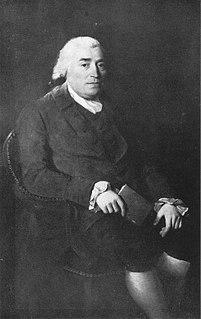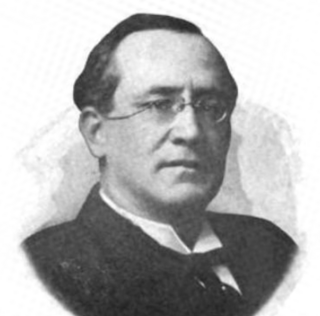
Adeline Virginia Woolf was an English writer, considered one of the most important modernist 20th-century authors and a pioneer in the use of stream of consciousness as a narrative device.

West Virginia is a state in the Appalachian, Mid-Atlantic and Southeastern regions of the United States. It is bordered by Pennsylvania to the north and east, Maryland to the east and northeast, Virginia to the southeast, Kentucky to the southwest, and Ohio to the northwest. West Virginia is the 10th-smallest state by area and ranks as the 12th-least populous state, with a population of 1,793,716 residents. The capital and largest city is Charleston.

John Edward Kenna was an American politician who was a Senator from West Virginia from 1883 until his death.

Arthur Ingram Boreman was an American lawyer, politician and judge who helped found the U.S. state of West Virginia. Raised in Tyler County, West Virginia, he served as the state's first Governor, and a United States senator, as well as represented Wood County in the Virginia House of Delegates, and served as a circuit judge before and after his federal service.

Thomas Fairfax, 6th Lord Fairfax of Cameron was a Scottish peer. He was the son of Thomas Fairfax, 5th Lord Fairfax of Cameron, and Catherine Colepeper, daughter of Thomas Colepeper, 2nd Baron Colepeper.

The Great Seal of the State of West Virginia was adopted in September 1863. The obverse center of the seal contains a boulder that has been inscribed June 20, 1863, the date West Virginia became a state. In front of the boulder lie two crossed rifles and a liberty cap as a symbol of the state's fight for liberty. The two men on either side of the boulder represent agriculture and industry. On the left stands a farmer with an ax and plow before a cornstalk. On the other side stands a miner with a pickax, and behind him an anvil and sledge hammer. The outer ring contains the text "State of West Virginia" and the state's motto "Montani Semper Liberi",. The reverse of the seal, also called the lesser seal, is the official seal of the Governor. Its motto reads "Libertas E Fidelitate".

The United States census of 1840 was the sixth census of the United States. Conducted by the Census Office on June 1, 1840, it determined the resident population of the United States to be 17,069,453 – an increase of 32.7 percent over the 12,866,020 persons enumerated during the 1830 census. The total population included 2,487,355 slaves. In 1840, the center of population was about 260 miles (418 km) west of Washington, near Weston, Virginia.

The Battle of Blair Mountain was the largest labor uprising in United States history and the largest armed uprising since the American Civil War. The conflict occurred in Logan County, West Virginia, as part of the Coal Wars, a series of early-20th-century labor disputes in Appalachia. Up to 100 people were killed, and many more arrested. The United Mine Workers temporarily saw declines in membership, but the long-term publicity led to improvements in membership and working conditions in the mines.

Samuel Price was Virginia lawyer and politician, who helped to establish the state of West Virginia during the American Civil War and became Lieutenant Governor, and later a United States senator.

The Paint Creek–Cabin Creek Strike, or the Paint Creek Mine War, was a confrontation between striking coal miners and coal operators in Kanawha County, West Virginia, centered on the area enclosed by two streams, Paint Creek and Cabin Creek.

William Gay Brown Sr. was a nineteenth-century politician and lawyer from Virginia, who was twice elected to the Virginia General Assembly and thrice to the U.S. House of Representatives. He also served at the Virginia Constitutional Convention of 1850 and later opposed secession at the Virginia Secession Convention of 1861. A leading Unconditional Unionist during the American Civil War, he became one of the founders of West Virginia.

George Robert Latham was a 19th-century Virginia farmer, lawyer and politician who helped found the state of West Virginia during the American Civil War, during which he served as a colonel in the Union Army. He later served one term in the United States House of Representatives representing West Virginia's 2nd congressional district (1864-1866), as well as became U.S. Consul in Melbourne, Australia (1867-1870) before returning to West Virginia to farm and hold various civic offices.

Daniel Haymond Polsley was a nineteenth-century lawyer, judge, editor and politician who helped form the State of West Virginia and served one term in the U.S. House of Representatives.

Charles Edgar Hogg was a lawyer, educator and politician who represented West Virginia's 4th congressional district (1887-1889). Although initially a Democrat, later in life he became an author as well as a Progressive Republican and dean of the West Virginia University School of law.

William Caulfield Raftery was an American football, basketball, and baseball coach. He was the 17th head football coach at Virginia Military Institute (VMI) located in Lexington, Virginia. He held that position for ten seasons, from 1927 until 1936. His career coaching record at VMI was 38–55–5. This ranks him fifth at VMI in total wins and 19th at VMI in winning percentage.
Bernie was an unincorporated community in Lincoln County, West Virginia, United States. It lies along Parsner Creek West Virginia on Lincoln County Route 40/1. It lies approximately 8.5 air miles southeast of the town of Hamlin, the county seat of Lincoln County. Its elevation is 833 feet. It had a post office that was approved June 12, 1893 but then closed on January 8, 1962; there were four Post Masters and the USGS maps of that era show Bernie on West Virginia, Lincoln County, Hager Quad at Location DD: 38.180373, -82.0117982. The first post office was originally proposed to be named "Pin Hook", but was changed to the unincorporated community name of Bernie with an estimated population of 200 according to the initial post office application and was located on the property of S.A. Egnor, and was later moved approximately 1,800 feet to the property of Alamander Elkins, because he had free gas for heat, on June 16, 1897, and was operated at that location until it was closed in 1962. After closing the mail for Bernie was rerouted through multiple post offices but the majority went to Griffithsville, West Virginia with the remaining through Alkol, West Virginia.

Alston Gordon Dayton was a United States representative from West Virginia and a United States district judge of the United States District Court for the Northern District of West Virginia.

Elliott Northcott was a United States Circuit Judge of the United States Court of Appeals for the Fourth Circuit.



















